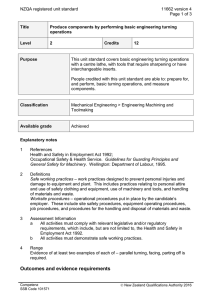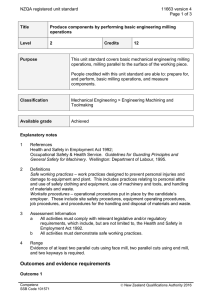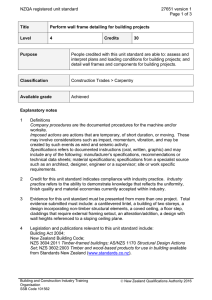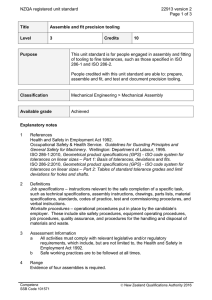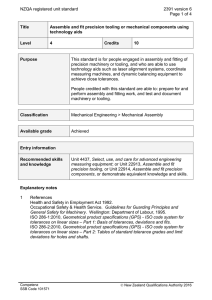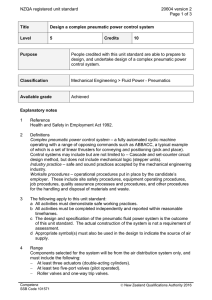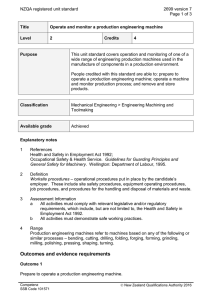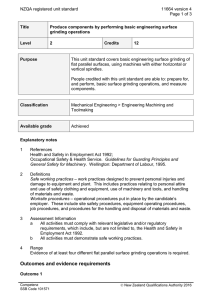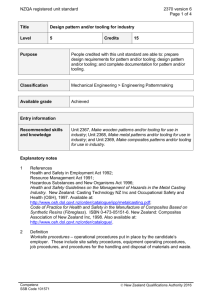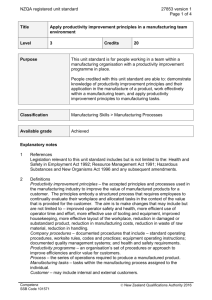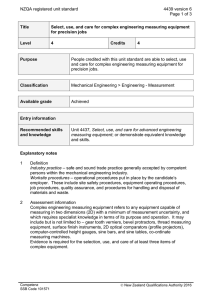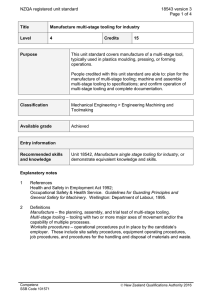NZQA registered unit standard 18542 version 3 Page 1 of 4
advertisement
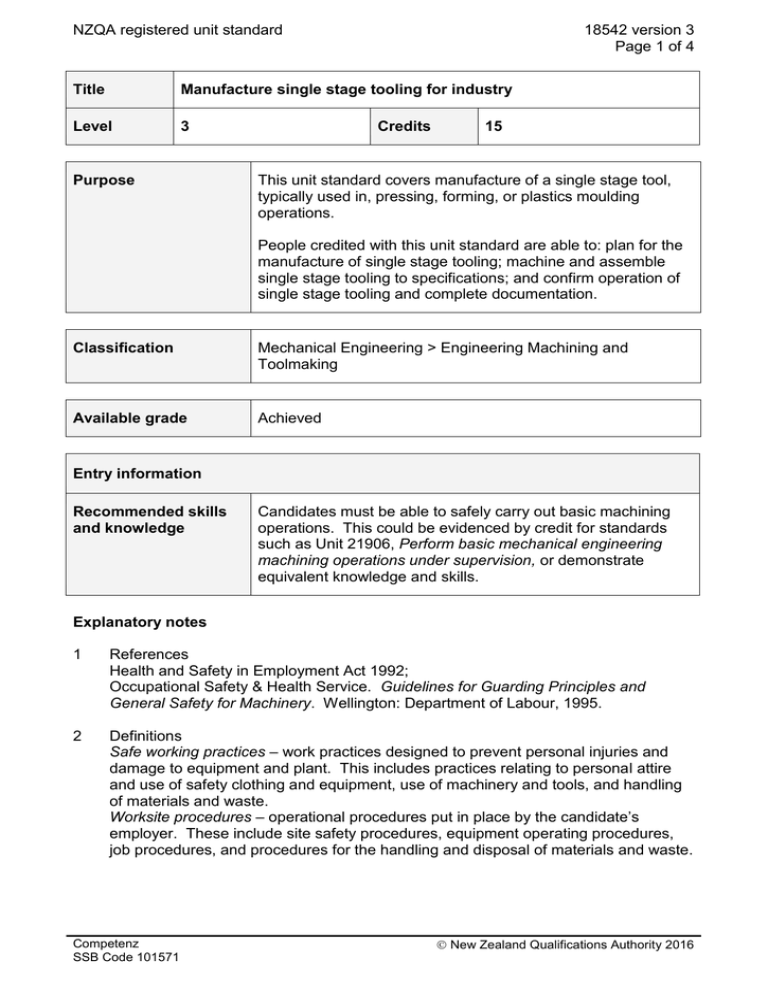
NZQA registered unit standard 18542 version 3 Page 1 of 4 Title Manufacture single stage tooling for industry Level 3 Purpose Credits 15 This unit standard covers manufacture of a single stage tool, typically used in, pressing, forming, or plastics moulding operations. People credited with this unit standard are able to: plan for the manufacture of single stage tooling; machine and assemble single stage tooling to specifications; and confirm operation of single stage tooling and complete documentation. Classification Mechanical Engineering > Engineering Machining and Toolmaking Available grade Achieved Entry information Recommended skills and knowledge Candidates must be able to safely carry out basic machining operations. This could be evidenced by credit for standards such as Unit 21906, Perform basic mechanical engineering machining operations under supervision, or demonstrate equivalent knowledge and skills. Explanatory notes 1 References Health and Safety in Employment Act 1992; Occupational Safety & Health Service. Guidelines for Guarding Principles and General Safety for Machinery. Wellington: Department of Labour, 1995. 2 Definitions Safe working practices – work practices designed to prevent personal injuries and damage to equipment and plant. This includes practices relating to personal attire and use of safety clothing and equipment, use of machinery and tools, and handling of materials and waste. Worksite procedures – operational procedures put in place by the candidate’s employer. These include site safety procedures, equipment operating procedures, job procedures, and procedures for the handling and disposal of materials and waste. Competenz SSB Code 101571 New Zealand Qualifications Authority 2016 NZQA registered unit standard 18542 version 3 Page 2 of 4 3 Assessment Information a All activities must comply with relevant legislative and/or regulatory requirements, which include, but are not limited to, the Health and Safety in Employment Act 1992. b All activities must demonstrate safe working practices. 4 Range a Single stage tooling may include but is not limited to tooling for processes involving – injection, extrusion, blow moulding; pressing, forming, die casting. b Evidence of one single stage tool is required. Outcomes and evidence requirements Outcome 1 Plan for the manufacture of single stage tooling. Evidence requirements 1.1 Toolmaking requirements are described for the type of tool to be manufactured. Range manufacturing principles and techniques, theory, calculations, functionality, safety requirements relative to product. 1.2 Tool to be manufactured is described and specifications are established and verified with supervisor. 1.3 Procedure for manufacture of the tool is identified according to the tool specifications. 1.4 Equipment, tools, and materials to be used in manufacture of the single stage tool are selected in accordance with specifications and worksite procedures. 1.5 Safety requirements are identified and explained in accordance with worksite procedures. Outcome 2 Machine and assemble single stage tooling to specifications. Evidence requirements 2.1 Material is machined to parts specifications. Parts requiring off-site work, if any, are processed in accordance with worksite procedures. 2.2 Tool is assembled in accordance with specifications and worksite procedures. 2.3 Equipment, tools, and work area are cleaned and waste material disposed of in accordance with worksite procedures. Competenz SSB Code 101571 New Zealand Qualifications Authority 2016 NZQA registered unit standard 18542 version 3 Page 3 of 4 Outcome 3 Confirm operation of single stage tooling and complete documentation. Evidence requirements 3.1 Operation of tool is observed and confirmed by client as meeting specifications. 3.2 Product produced by the tool is confirmed by client as meeting specifications, and refinements carried out if required. 3.3 Documentation for the tool is completed in accordance with worksite procedures. Planned review date 31 December 2014 Status information and last date for assessment for superseded versions Process Version Date Last Date for Assessment Registration 1 26 September 2001 31 December 2012 Review 2 20 June 2006 N/A Rollover and Revision 3 17 November 2011 N/A Consent and Moderation Requirements (CMR) reference 0013 This CMR can be accessed at http://www.nzqa.govt.nz/framework/search/index.do. Please note Providers must be granted consent to assess against standards (accredited) by NZQA, before they can report credits from assessment against unit standards or deliver courses of study leading to that assessment. Industry Training Organisations must be granted consent to assess against standards by NZQA before they can register credits from assessment against unit standards. Providers and Industry Training Organisations, which have been granted consent and which are assessing against unit standards must engage with the moderation system that applies to those standards. Requirements for consent to assess and an outline of the moderation system that applies to this standard are outlined in the Consent and Moderation Requirements (CMR). The CMR also includes useful information about special requirements for organisations wishing to develop education and training programmes, such as minimum qualifications for tutors and assessors, and special resource requirements. Competenz SSB Code 101571 New Zealand Qualifications Authority 2016 NZQA registered unit standard 18542 version 3 Page 4 of 4 Comments on this unit standard Please contact Competenz qualifications@competenz.org.nz if you wish to suggest changes to the content of this unit standard. Competenz SSB Code 101571 New Zealand Qualifications Authority 2016
